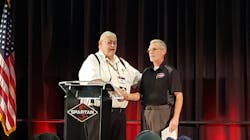EVT of Year: Carcinogens in Cabs Killing Mechanics
When it comes to fire apparatus, one of the hottest topics is clean cab designs and how to keep cancer-causing agents out of fire trucks and keep firefighters safe. Equally important but not as obvious is the need to isolate people who work on them from the bad stuff, too.
“My perspective comes from the realization that we, as [emergency vehicle] technicians are exposed to the very same carcinogens and chemicals that are killing too many members of the fire service,” said Al Hasenfratz, an EVT with the Sylvania Township, OH, Fire Department, as he spoke to colleagues in Lansing, MI, at Spartan Motors’ 25th Annual Fire Truck Training Conference.
“The vehicles, and the equipment they carry, are very likely to expose you, the technician, the problem solver of the industry, to the very same substances,” said Hasenfratz, who was Firehouse's EVT of the Year in 2018.
Hasenfratz said EVTs have already died from job-related cancers, the same kinds that have been killing firefighters and emergency medical personnel.
“They are being stricken at an alarming and unacceptable rate,” he said. “And they are our teammates, the firefighters, the vendors, the technicians, everyone is on the same team and that’s the bad news.”
There are, however, ways to mitigate the hazards, Hasenfratz said to the hundreds of EVTs who attended Monday night’s Spartan awards presentation.
“There are steps we can take as emergency vehicle professionals to help minimize our exposures,” he said. “Treat every vehicle, fire apparatus, and ambulances, as potential hazmat environments. And that’s exactly what they are in my opinion.”
First on his list of remedies is the enlisting of firefighters and fire department personnel to help remove all items that might have accumulated in the cabs, including airpacks, EMS gear, portable radios, maps and “assorted crap and items that always, somehow, find their way jammed into the cabs of fire apparatus.”
If fire personnel are not available to help with that chore, Hasenfratz recommended mechanics consider using personal protective equipment, like surgical masks and exam gloves when faced with removing that equipment singularly.
“Both of these items are inexpensive or free for the asking at the fire stations,” he said.
Next, he recommended EVTs avoid soot, dust, liquids, mud and contaminates on all surfaces, including soft ones like seats, headliners and upholstery.
Some other less obvious surfaces to be cautious with while handling include steering wheels, shift and park controls, window cranks, cabin doors and seat belts.
“All of these items can be wiped off with the anti-microbial wipes that are usually found on rigs or at the fire station,” he said, adding that “old fashion soap and water” works as well as the cheap and disposable baby wipes.
While it might seem like an easy solution, Hasenfratz urged mechanics to resist using compressed air to blow the particulates out of the truck cabs.
“The last thing you want to do is send all that particulate matter into the air and into your lungs,” Hasenfratz said. “And that’s a gift you don’t want.”
He also said EVTs could use disposable seat covers and, if those aren’t available, clear trash bags would also help isolate mechanics from exposure to carcinogens.
A stack of towels, often available through the EMS side of the firehouse and hospitals, are effective at drying off surfaces that have been wiped down, he said, adding that they also make good disposable floor mats to help isolate particulates from the EVTs who might be crawling under seats and behind cabinets chasing wires. Hasenfratz also said mechanics need to take caution while servicing cabin filters in the cabs, which might be laden with carcinogens.
Some easy solutions include wearing long-sleeve shirts and long pants while working on fire apparatus to reduce particulate exposure, he said.
“If possible, change your clothes between jobs,” Hasenfratz said. “At the very least, try not to bring your dirty clothes home.”
Hasenfratz said he understands the pressures facing EVTs to get the rigs back in service as quickly as possible, but that’s no excuse not to take some precautions.
“It’s worth the extra few minutes to decon the area you’ll be working on to protect the best you can,” he said.
He said he offered a few of his ideas, not to preach, or dictate solutions, but to inspire other EVTs to have conversations about things they can do in their own shops and protect themselves from “very real dangers.”
“Given the fact that few people are beating down the doors to enter this profession, your communities and, more importantly, your families, are relying on you to be around for a long time,” Hasenfratz said.
He also encouraged other EVTs to mentor and encourage youngsters to pursue careers as EVTs.
“After all, someone has to do this crazy job when the rest of us are too old or retiring,” he said.
As he concluded his presentation, Bill Foster, vice president and founder of Spartan Motors, thanked Hasenfratz for his words of wisdom.
“I hope some of that sunk in,” Foster said. “The amount of cancer in our vocation is rising daily. ...Let’s think about what we are doing. Let’s use some common sense. …When you bring a rig into the garage, you need to think about all the carcinogens that are in there and you need to do what you can to get rid of it. That’s probably the most important thing you can do.”
